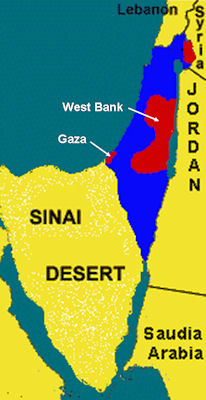An independent Palestinian state can't survive
© David Burton 2005

An independent Palestinian state can't survive© David Burton 2005 |
 |
 |
 |
 |
 |
 |
 |
 |
 |
 |
 |
 |
 |
As a Palestinian State appears to be coming into existence, under the aegis of President George W. Bush’s “roadmap to peace”, the question remains as to what will happen to this Palestinian state after its creation. Looking at the question objectively, one is forced to the conclusion that an independent Palestinian state is not viable. Many of the reasons for this conclusion are provided in an article written by Carl Alpert (Ref. 1). In this article, Alpert made the following points. “There has never a Palestinian state. It never existed, was never destroyed. There is no history, no tradition, no literature, no past.” The Palestinians have lived under the rule of a number of occupiers that include the Ottoman Empire, Great Britain, Jordan, Egypt, and Israel. Over the past decade, the Palestinians have been led around by the nose by Yasser Arafat and his PLO thugs. “There is no native population, The great majority of the present population in the area are descended from Arabs who immigrated form surrounding countries. . .” It should be pointed out that a Palestinian state has existed for the past ¾ of a century in three-quarters of the territory that the British mandate undertook to develop as a Jewish homeland under the Balfour declaration. This Palestinian state is known as Jordan. Jordan is inhabited by Arabs, speaks the Arab language and is predominantly Muslim. When a Palestinian state is created from the West Bank and Gaza areas, this state will always be a divided unit, part in Gaza and part in the West Bank, separated by Israel. The two units cannot be connected because to do so would bisect Israel, separating the Negev from the rest of the country.
Alpert further notes that, “. . . there is absolutely no economic justification for its
(the Palestinian state) existence. There is no industry to speak of.” The largest Palestinian
industry is a meat processing plant employing only 88 people. “Agriculture is marginal
economically, exports minimal, natural resources none. No one with a head on his shoulders
is going to invest any money in developing this hopeless area.” It should be noted that in
the more than 50 years since the creation of the State of Israel, none of the Palestinians’
Arab brethren have invested any significant money in their economy. What monies the Arab
countries have provided has largely gone to fund terrorist organizations and their operations.
“Before the Intifada, the income from employment in Israel constituted more than 40 percent
of the Palestinian population’s earnings. By declaring war on Israel and practicing terrorism,
the Palestinian Authority cut off most of this income and practiced economic suicide.
As we can see in the following example from reference 2, the Arab mindset is one of self-destruction and self-pity.
“When James Wolfensohn and Mort Zuckerman raised $14 million
to buy the Gush Katif hothouses from Israeli farmers to give to the Palestinians, many people
were surprised. ‘We thought it was a chance to show the Palestinians that there were more
benefits from cooperation than confrontation,’ Zuckerman explained.
What is the solution to this dilemma? Two possibilities present themselves. One possibility is for Israel to permanently annex the territories and expel those Arab residents that are unwilling to live under Israeli sovereignty. The second possibility is to incorporate the West Bank into Jordan and Gaza into Egypt. This option has certain obvious benefits. First the problem of a geographically divided Palestinian ‘homeland’ is avoided. Second, the economic future for the residents of Gaza and the West Bank is somewhat brighter than that which will result from the formation of a Palestinian state. ------------------------------------------------------------------------------------------------------------References:
|
| 18 October 2005 {Article 4; Israel_02} |